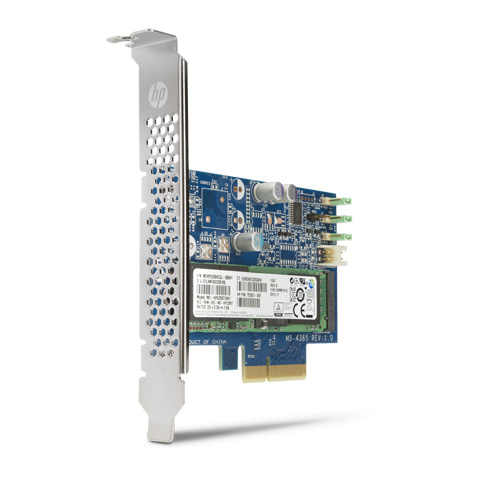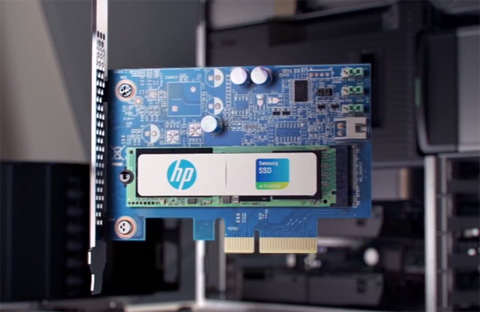
The HP Z Turbo Drive herald the arrival of PCI Express SSD storage in mainstream workstations
HP is changing the face of mainstream workstation storage by offering a new PCI Express Solid Stage Drive (SSD) in its HP Z Workstations. The new HP Z Turbo Drive, which slots straight into the workstation motherboard, rather than a 2.5-inch drive bay, is designed to overcome the bandwidth limitations of the SATA 3.0 interface.
The Z Turbo Drive comes in 256GB or 512GB capacities and boasts around twice the sequential read / write performance of the best performing SATA 3.0 SSDs, which plateau around 500MB/sec – 540MB/sec.
HP’s 512GB model boasts speeds of 1.17GB/sec (read) and 930MB/sec (write); the 256GB model 1.08GB/s (read) and 800MB/sec (write). It’s a massive improvement over SATA 3.0 – but will probably benefit some users more than others.
CAD models continue to swell but it’s unlikely they will load in half the time with the new HP Z Turbo Drive. 3D assemblies typically comprise a number of smaller parts so the performance increase is likely to be far smaller. Those working with simulation and design visualization should benefit most, as these workflows often include large single files.
Regular readers of DEVELOP3D will know one of the biggest paybacks of SSDs is their ability to perform impressively in random read/write tasks. HP told us that while the Z Turbo Drive will give an advantage over SATA 3.0 SSDs in this respect it will be less pronounced.
One of the most exciting things about the HP Z Turbo drive is the price. The 256GB version will set you back a mere $499; the 512GB model $899. As far as professional-level PCI Express based SSD storage goes, this is eminently affordable, though still more expensive than an equivalent 2.5-inch SSD.
It is significantly cheaper than most workstation-class PCI Express SSDs though, which can run into several thousand. While these high-end cards may be faster, the technology is well out of reach of most workstation budgets. Now HP can cater to all budgets with its SSD offerings, which includes standard 2.5-inch drives as well as high-end Fusion-io PCI Express cards. HP Z Turbo Drives are also scaleable and can be set up in RAID array to significantly boost performance.
The core technology for HP’s first generation Z Turbo Drive comes from Samsung. The Korean manufacturer provides the M.2 SSD module, which includes the NAND, controller and firmware. It is mounted on the HP-designed half-height, half-length PCI Express card.
Reliability is essential for a professional SSD and the M.2 module includes Samsung’s professional grade MLC NAND flash memory, the same type used in the company’s excellent Samsung 840 Pro SSD.
HP quotes an endurance of 146TB and 292TB Total Bytes Written respectively for its 256GB and 512GB models. If our maths is correct, this is the equivalent of writing 160GB every day for five years. That’s an awful lot of data, particularly as Samsung considers a typical use scenario for heavy 3D mechanical CAD to be 43GB/day. The HP Z Turbo Drive comes with a three-year warranty.
Despite Samsung’s respected position in the SSD market, HP will not be shouting about its partnership with the Korean giant. HP told DEVELOP3D that it’s not really possible to have a co-branded storage product as NAND technology moves so quickly. It also has to be careful of supply chain concerns.
It’s an interesting situation as Samsung announced last year that it is keenly seeking to increase brand visibility of its SSD technology through its Samsung SSD activated programme – the idea being that PC customers should know their brand of SSD as much as they do their CPU and GPU.

Samsung’s SSD branding is visible on the promotional video, but not on the product photography
HP will be making the Z Turbo Drive available in its HP Z230, HP Z420, HP Z620, and HP Z820 desktop workstations as well as offering it as an upgrade for existing customers of thee products. It is expected to be available in May.
We expect other workstations vendors to follow soon.






